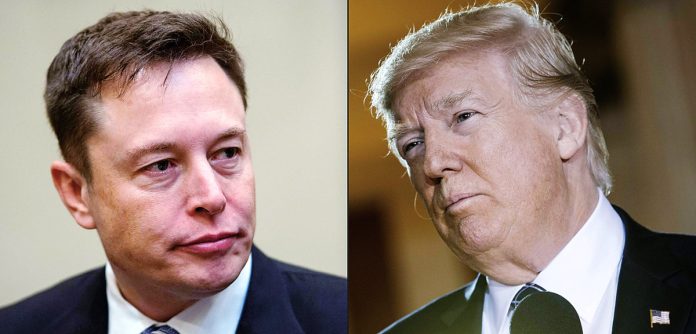HOLLYWOOD could not have produced a more riveting movie,
playing out to audiences in the United States and around the world – accessible to anyone with a smartphone.
Just days after praising Elon Musk as “one of the greatest business leaders and innovators the world has ever produced” and crediting him with a leading role in the “most sweeping and consequential government reform effort in generations”, President Donald Trump is now engaged in a no-holds-barred fight with his “First Buddy”.
Although the battlefield is the US and “the big beautiful bill” at the centre of their conflict,
the showdown has rapidly degenerated into a public brawl with larger implications between what many see as the two most powerful and richest men in the world.
It is a fight that is unprecedented for its below-the-belt attacks, financial threats and allegations of misconduct and impropriety.
The stakes
American analysts following this feud have assessed it in terms of the domestic impact of the largest spending bill in American history.
The “big and beautiful” federal spending proposal is estimated to add a possible US$2.4 trillion (RM10.2 trillion) to America’s debt over the next decade, according to the non-partisan Congressional Budget Office.
Musk has described the bill as “a disgusting abomination” and as “massive, outrageous and pork-filled”, and warned of its negative impact on America’s debt burden and the lives of ordinary Americans.
Trump, on the other hand, sees the bill as improving “the fiscal trajectory of the United States” and unleashing “an era of unprecedented economic growth”.
He has also characterised it as arguably “the most significant piece of legislation that will ever be signed in the history of our country!”
“Myth, hoax, grotesque and immoral” are some of the descriptions thrown by the Democrats and Republicans at each other’s position on the bill as well as at the protagonists.
These will not be the last words hurled in this ongoing battle and can have serious implications for the economic future and well-being of
the US.
Geopolitical ramifications of the fallout
Elsewhere in the world, the fallout effects in the relationship between Trump and Musk are also receiving special attention given the significant influence that the two leaders command in global politics and business.
Here is a breakdown of potential effects on global geopolitics:
Impact on US tech policy Musk’s involvement, particularly as head of the Department of Government Efficiency (DOGE) established to streamline bureaucracy and shift national technological policy, now appears to have ended.
The feud, transforming a personal clash into a geopolitical catalyst, will accelerate tech decoupling away from the US. While immediate crises may not arise, allies and adversaries will recalibrate strategies to navigate this new development and instability.
Economic instability and trade wars Trump’s latest tariff and protectionist policy measures have already sparked resistance in countries around the world.
Musk’s opposition to Trump’s recent tax and spending bill, which impacts the electric vehicle and space industry, suggests a potential for continued internal conflict that could translate into unpredictable economic and security policies with global repercussions.
Shifting political alliances and funding
Musk’s significant financial contributions to Trump and Republican candidates in the past indicate a volatile landscape for political funding and influence. This internal money and political shifting will impact the rivalry between Democrats and Republicans as well as American foreign policy-making.
Soft power and international perception
The public spectacle of the Trump-Musk fallout has significantly reinforced perceptions of unpredictability and internal discord within the US. This, in turn, is eroding trust among allies and weakening the soft and hard power foundations of America’s global hegemony.
Nato and European relations
The Trump administration’s questioning of Nato’s value and Trump’s transactional approach to alliances have strained relations with European allies. The internal US political discord, amplified by the Trump-Musk feud, has further introduced uncertainties to these alliances, including in areas of defence and security. Trump’s and Musk’s interventions are pushing European nations to seek greater self-reliance in foreign policy.
Blurring lines between corporate and state authority
Musk’s intervention in US policy decisions highlights a growing shift in the balance of power between government and corporations. The fallout could affect the ability of private entities to shape national and international policies.
Influence of social media platforms
The public nature of their dispute, largely conducted on X (formerly Twitter) and Truth Social, and hugely amplified by mainstream media, underscores the increasing role that social media platforms play as arenas for geopolitical discourse.
This can lead to rapid shifts in sentiment and policy, with the potential for unintended consequences.
What is clear is that the Trump-Musk fallout is more than just a personal dispute or one
with consequences for solely American domestic policy.
Although a highly visible manifestation of political and economic tensions within the US, the reverberations are likely to contribute to more unpredictable and potentially volatile geopolitical dynamics in view of the global reach of the two.
Longer-term impact
Presently, Musk is at the receiving end of a demonising campaign by Trump and his Republican colleagues, which shows little sign of abating or reconciliation, although this is being urged by a small number of Musk’s Republican supporters.
Meantime, he has incurred a significant financial loss with his net worth plummeting by an estimated US$34 billion, mainly due to the fall in Tesla’s share price. Despite this massive decline, Musk remains the world’s wealthiest individual, with a fortune estimated at US$334.5 billion, according to Bloomberg.
In response, he has called for a new US party targeting the “80% in the middle”. Should this development take place, it could fracture conservative and progressive movements, and further weaken US foreign policy cohesion.
Although unlikely to happen, given the record of third parties in America, such a development may well provide the catalyst needed to make America greater than what it presently is.
For now, this is Musk’s consolation shared with his supporters: “Trump has 3.5 years left as president,” Musk wrote on X, “but I will be around for 40-plus years.”








